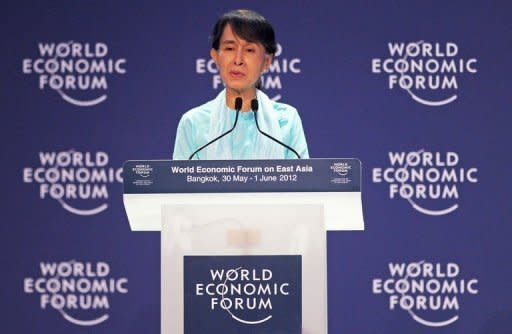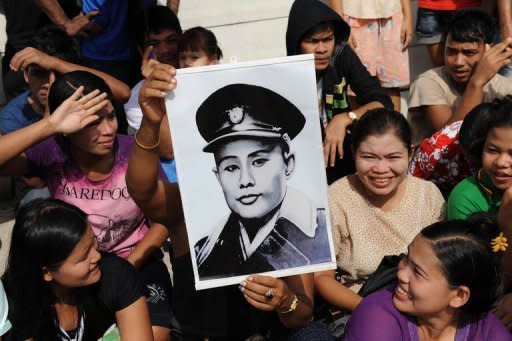Suu Kyi urges 'healthy scepticism' over Myanmar reform
Democracy leader Aung San Suu Kyi on Friday urged "healthy scepticism" over Myanmar's dramatic reforms, saying only the rule of law can cement recent political progress and foster clean investment. Speaking at a gathering of world business leaders in Bangkok, she also warned China and the United States against turning Myanmar into a "battling ground" as they vie for influence over the strategically important nation. On her first major international engagement after more than two decades of isolation, the Nobel laureate dampened what she called "reckless optimism" over democratic measures taken under reformist president Thein Sein. Appealing to delegates to "think deeply" about the wider good of Myanmar, she said hope in her country's future since the end of five decades of authoritarian rule last year should be tempered by caution. "A little bit of healthy scepticism is in order," she told the packed auditorium. In practical terms, Myanmar needed the "rule of law" more than anticipated investment legislation, Suu Kyi said, as the country tries to embed democratic reforms, lift millions out of poverty and defuse the "timebomb" of high youth unemployment. Companies are hungrily eyeing resource-rich Myanmar after political reforms were rewarded by the easing of some international sanctions. But Suu Kyi expressed fears a flood of investment -- and international competition for a foothold in the nation -- could deepen graft and serve the country's elite. "We do not want investment to mean more possibilities for corruption," the 1991 Nobel Peace Prize laureate said. "We do not want investment to mean greater inequality. And we do not want investment to mean greater privileges for those already privileged." Resource-rich but poor Myanmar has a history of engagement with Beijing, but Washington has recently sought closer ties with the quasi-civilian government, easing some sanctions to reward the end of military rule. "I'm always very concerned when Burma is seen as a battling ground for the United States and China," she told reporters in a press conference following her forum address, using Myanmar's former name. "It should not be so, it should be an area of harmony for those two big countries," she said, adding that Myanmar and China had been "good neighbours" for many years. Exhorting potential donors to empower rather than undermine civic society, she said genuine change can only blossom from within the nation. "They say God helps those who help themselves," Suu Kyi added. "I'm sure the international community helps those who help themselves too." The pro-democracy campaigner has stolen the show at the Bangkok forum, posing for endless photographs as she shuttles between forum events and visits to meet Myanmar migrants. Chris Herink, country director for World Vision, said her address was received with "rapt interest" by delegates, who represent governments, the private sector and civil society groups. "I think what was gratifying to me in the address... was her ability to speak to all of these audiences," he said. Having spent 15 of the past 22 years under house arrest, Suu Kyi has taken an increasingly global role as Myanmar sheds its pariah status, meeting top world dignitaries in Yangon and encouraging easing of Western economic sanctions. Reflecting on her debut trip after decades inside Myanmar, the pro-democracy leader recalled the moment she flew into Bangkok, saying she was struck by the city's illuminated nightscape. "I had just left a Burma that was suffering electricity cuts... I thought thirty years ago the scene that met my eyes landing in Bangkok, would not have been very different from landing in Yangon." Rallies last week against power cuts in several cities including Yangon and Mandalay, were the first major protests in years, testing the regime's tolerance of public discontent. Suu Kyi, who addressed joyful crowds of Myanmar migrants on her first full day in Thailand, is scheduled to travel to the country's north to meet Myanmar refugees on Saturday before returning to her homeland on Sunday. Europe is next on the horizon, where Suu Kyi will address an International Labour Organization conference in Geneva and give a speech in Oslo to finally accept the Nobel Prize she was awarded in 1991. She also intends to travel to Britain, where she lived for years with her family, and will address parliament in London.


